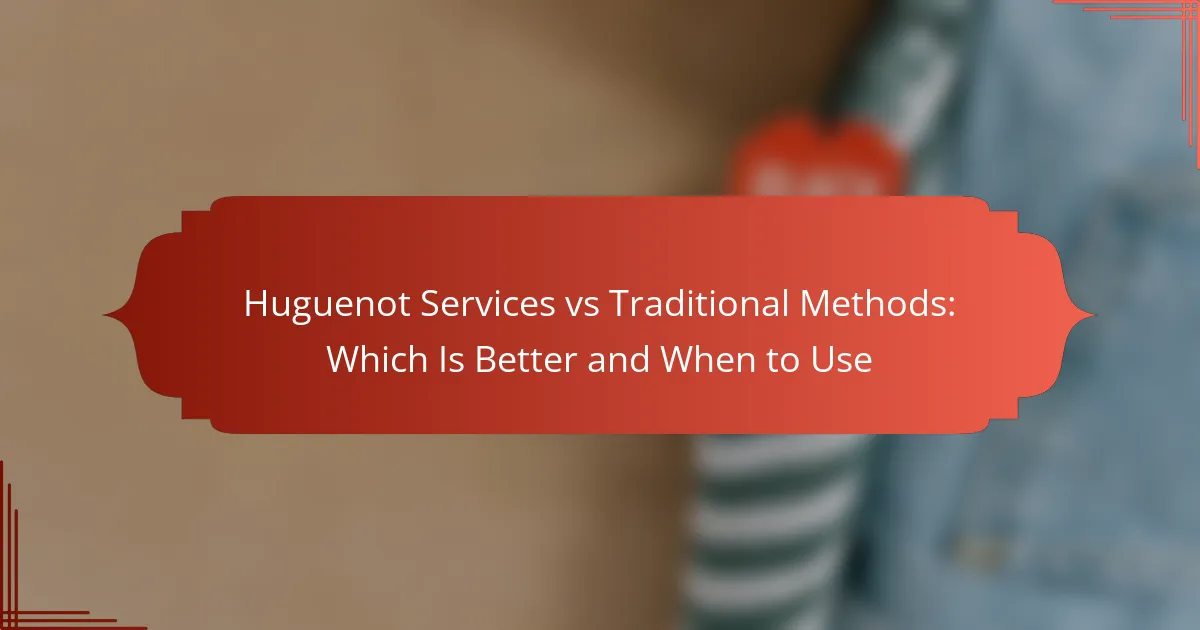Huguenot Services offer specialized solutions that address the unique cultural and historical needs of individuals and communities, ranging from educational programs to community support initiatives. In contrast, traditional methods rely on established techniques and practices that emphasize familiarity and reliability. Understanding when to use Huguenot Services over traditional methods can enhance effectiveness, particularly in situations requiring flexibility and a personalized approach.

What are Huguenot Services?
Huguenot Services refer to specialized offerings that cater to the unique needs of individuals and communities, often focusing on cultural and historical aspects. These services can encompass a range of activities, from educational programs to community support initiatives.
Definition of Huguenot Services
Huguenot Services are designed to provide assistance and resources that honor the heritage and traditions of the Huguenot community. They often include cultural education, historical preservation, and community engagement activities aimed at fostering a deeper understanding of Huguenot history.
These services can be offered by various organizations, including cultural centers, non-profits, and educational institutions, and may vary significantly based on local needs and resources.
Key features of Huguenot Services
Key features of Huguenot Services include cultural education programs, historical workshops, and community outreach initiatives. These programs often emphasize storytelling, art, and music that reflect Huguenot traditions.
Additionally, many services provide resources such as access to archives, genealogical research support, and events that celebrate Huguenot heritage, helping to keep the culture alive for future generations.
Benefits of Huguenot Services
The benefits of Huguenot Services are manifold, including the preservation of cultural identity and the promotion of community cohesion. By engaging with these services, individuals can connect with their heritage and foster a sense of belonging.
Moreover, these services can enhance educational opportunities, allowing participants to learn about historical events and figures that shaped the Huguenot experience. This knowledge can empower communities and encourage active participation in cultural preservation efforts.

What are traditional methods?
Traditional methods refer to established techniques and practices used for various tasks, often relying on manual processes or conventional tools. These methods have been in use for a long time and are characterized by their familiarity and reliability in specific contexts.
Definition of traditional methods
Traditional methods encompass a range of practices that have been developed over time, often passed down through generations. They typically involve hands-on approaches and utilize basic tools rather than advanced technology. Examples include manual farming techniques, artisanal craftsmanship, and face-to-face customer service.
Key features of traditional methods
Key features of traditional methods include simplicity, direct human involvement, and a focus on time-tested practices. These methods often prioritize quality over speed, allowing for meticulous attention to detail. Additionally, they may involve local materials and resources, fostering community engagement and sustainability.
Benefits of traditional methods
Traditional methods offer several benefits, including a strong connection to cultural heritage and community values. They can promote craftsmanship and quality, often resulting in superior products or services. Furthermore, these methods can be more environmentally sustainable, as they frequently rely on local resources and minimize reliance on industrial processes.
However, it is essential to consider the context in which traditional methods are applied. In some situations, they may be more time-consuming or less efficient than modern alternatives. Understanding when to use traditional methods versus contemporary techniques can enhance effectiveness and satisfaction in various tasks.

When to use Huguenot Services?
Huguenot Services are best utilized when traditional methods fall short in meeting specific needs or when a more tailored approach is required. These services excel in scenarios that demand flexibility, personalization, and a deeper understanding of unique circumstances.
Best scenarios for Huguenot Services
Huguenot Services are ideal in situations where clients require customized solutions that traditional methods cannot provide. For example, complex projects with unique requirements or clients needing specialized support often benefit from these services. Additionally, when time constraints are tight, Huguenot Services can offer expedited processes that traditional methods may not accommodate.
Another scenario includes cases where traditional methods lead to dissatisfaction or inefficiencies. Huguenot Services can address these gaps by providing more responsive and adaptive solutions, ensuring that client expectations are met effectively.
Target audience for Huguenot Services
The target audience for Huguenot Services includes individuals and organizations seeking personalized assistance that traditional methods do not adequately address. This may encompass small businesses needing tailored strategies or individuals facing unique challenges that require specialized expertise.
Moreover, clients who value flexibility and responsiveness in service delivery are prime candidates for Huguenot Services. These services appeal to those who prioritize quality and customization over standardization, making them suitable for a diverse range of sectors and demographics.

When to use traditional methods?
Traditional methods are best utilized in situations where established practices and personal interactions are valued. They are often effective in environments where familiarity and trust play a crucial role in achieving desired outcomes.
Best scenarios for traditional methods
Traditional methods shine in scenarios that require a personal touch, such as in small businesses or community-focused services. For example, face-to-face consultations in healthcare or personalized customer service in retail can foster stronger relationships and enhance customer satisfaction.
Additionally, traditional methods are beneficial in industries with strict regulations, where established protocols must be followed. In these cases, relying on proven practices can minimize risks and ensure compliance with local laws.
Target audience for traditional methods
The target audience for traditional methods typically includes individuals who prefer personal interaction over digital communication. Older generations or those less comfortable with technology often appreciate the direct engagement that traditional methods provide.
Moreover, businesses targeting local communities or niche markets may find traditional methods more effective. These audiences often value the trust and familiarity that come from face-to-face interactions, making them more likely to engage with services delivered through conventional means.

How do Huguenot Services compare to traditional methods?
Huguenot Services offer a modern approach that contrasts with traditional methods, often providing unique benefits in specific contexts. Understanding their differences can help determine which method is more suitable for your needs.
Cost comparison
Huguenot Services typically involve a different pricing structure compared to traditional methods. While traditional services may have fixed costs, Huguenot Services can vary based on the complexity and customization required, often leading to more flexible pricing options.
For example, traditional methods might charge a flat fee, while Huguenot Services may offer tiered pricing based on the level of service, which can range from low hundreds to several thousand dollars depending on the scope of work. Evaluating your budget against these options is crucial.
Effectiveness comparison
Effectiveness can differ significantly between Huguenot Services and traditional methods, depending on the specific goals and context. Huguenot Services often leverage innovative techniques that can yield faster results, especially in dynamic environments.
In contrast, traditional methods may provide more established and predictable outcomes, which can be beneficial for risk-averse situations. Assessing the effectiveness of each approach should consider the specific objectives and the likelihood of achieving them with either method.
Time efficiency comparison
When it comes to time efficiency, Huguenot Services often excel due to their streamlined processes and modern tools. This can lead to quicker turnaround times, sometimes reducing project durations by a significant margin.
Traditional methods, while reliable, may involve longer timelines due to established protocols and practices. For projects with tight deadlines, Huguenot Services may be the preferable choice, but it’s essential to weigh the urgency against the potential quality of outcomes.

What are the prerequisites for choosing between Huguenot Services and traditional methods?
Choosing between Huguenot Services and traditional methods depends on your specific needs, resources, and the context of your project. Consider factors such as the complexity of the task, available budget, and desired outcomes to make an informed decision.
Understanding Huguenot Services
Huguenot Services typically involve specialized techniques and approaches that may offer unique benefits compared to traditional methods. These services often leverage modern technology and innovative practices, making them suitable for complex or niche projects.
When considering Huguenot Services, evaluate the specific advantages they provide, such as efficiency, customization, and potential cost savings in the long run. They may be particularly beneficial in scenarios requiring rapid adaptation or specialized expertise.
Evaluating Traditional Methods
Traditional methods are often well-established practices that have been used successfully over time. They may provide a sense of reliability and familiarity, making them a good choice for straightforward tasks or projects with limited complexity.
When using traditional methods, assess their effectiveness based on your project’s requirements. They can be more predictable in terms of outcomes and costs, but may lack the flexibility offered by Huguenot Services.
Key Considerations for Decision Making
When deciding between Huguenot Services and traditional methods, consider factors such as project scope, budget constraints, and timelines. Huguenot Services may be more suitable for projects that require innovation, while traditional methods might be best for routine tasks.
Additionally, think about the skills and resources available to you. If your team is more experienced with traditional methods, it may be prudent to stick with what they know unless the project demands otherwise.
Practical Examples
For instance, if you are launching a new product that requires rapid market testing, Huguenot Services could offer the agility needed to adapt quickly. Conversely, for a simple marketing campaign, traditional methods might suffice and keep costs lower.
Ultimately, the choice should align with your project goals, ensuring that you select the method that best meets your needs while considering potential trade-offs.
